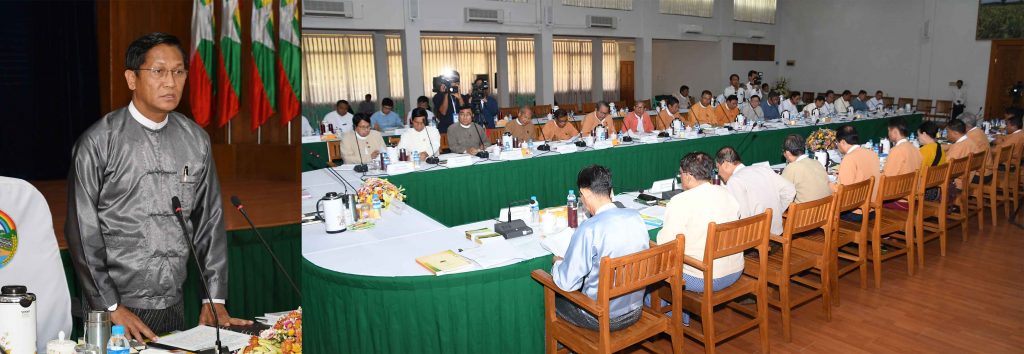As head of the Leading Committee for the Farmer Rights and, Vice President U Henry Van Thio called on the committee to speed up full enforcement of the Law of Protection of the Farmer Rights and Enhancement of their Benefits since the law passed its second amendment on 18 December 2018.
The Vice President made this remark at a meeting with members of the leading committee held at the Ministry of Agriculture, Livestock and Irrigation in Nay Pyi Taw yesterday.
The Vice President highlighted the fact that the second amendment to the law stipulates seven additional provisions, including working to aid farmers with losses incurred, to ensure security in working on their farmlands, and to enact a law concerning establishment of farmers’ associations, all mentioned in Chapter 2, Section 2 of the law.
He stressed the importance of cooperating with private corporations to the working committees and working groups formed with representatives of ministries, state and region governments, and NGOs. He said the agriculture sector is critically important to Myanmar as rice production provides the main source of food for the country and generates tremendous income from exports.
The Vice President said although Section 8, Subsection (a) of the same law grants farmers the right to cultivate other crops of their choice on their farmland as long as it does not negatively impact the overall production of rice, the main staple of the country, we must exercise reason to choose crops that will greatly benefit our respective region in addition to our personal benefit.
He said we must establish a Rice Market Price Regulation Committee along with the other established committees and groups. He said the organic cultivation system is sustainable and does not damage the topsoil, ecosystem and other living things while producing safe and high-quality crops. Organic farming promotes coexistence among different species and focuses on harmony with the ecology of the relevant region, and thus, is effective in raising crop production, said the Vice President.
He said Myanmar started practicing the organic standards guidelines on 26 January. Myanmar has also enacted the Myanmar version of the ASEAN GAP Guideline and has been issuing GAP Certificates, said the Vice President.
He said projects to cultivate coffee beans, cocoa, tea leaves, and elephant foot yam are in progress and have seen a degree of success. Currently there is a 5,000-acre organic coffee zone in Thandaunggyi, tea and coffee plantations are expanding in Chin State, cocoa plantations also expanding in five townships in Taninthayi Region, and an increase in demand for elephant foot yam for consumption as well as medicinal use, said the Vice President.
He said works are underway to develop the rubber production sector, including forming relevant committees and associations composed of the cultivators, factory owners and private sector organizations.
The Vice President also mentioned the success of the 2018 and 2019 Seed Fairs and the introduction of the Myanmar Seed Portal on 11 November 2018. He said farmland management groups from the Nay Pyi Taw Council and states and regions and the central group are performing assessments in line with existing farmland laws (2012), bylaws, rules and regulations to ensure famers can safely use their farmlands for other purposes besides farming.
The Vice President said that during the meeting of the Committee on Security, Stability and Rule of Law in the Republic of the Union of Myanmar, on 2 May 2018, a decision was reached to keep the rate of fines for using farmlands for other purposes without a permit, the same for pre-2012 and post-2012 cases.
The Vice President highlighted the amendment to The Vacant, Fallow and Virgin Land Management Law was passed into law on 11 September 2018 and intends to resolve cases of use of these lands without proper permits by issuing official permits and ensuring relevant benefits for the nature of the business conducted. He said relevant regional authorities have conducted field visits and surveys to hard to access areas concerning land use.
Next, the Secretary of the Leading Committee and Union Minister for Agriculture, Livestock and Irrigation, Dr. Aung Thu, explained support provided to farmers who suffered natural disasters, implementation of GAP, Myanmar organic standards, and production of good specimens, conducting agriculture and livestock research and awareness raising programs for farmers, and the management of vacant, fallow and virgin lands.
Other members of the Leading Committee, including Union Ministers and the Union Attorney-General, then engaged in various discussions. Following this, committee members Nay Pyi Taw Council Chairman and chief ministers of states and regions presented their completed and ongoing implementation of the decisions from the 1/2018 meeting. The Chairman of the Myanmar Rice Federation also explained prospects for establishing the Rice Market Price Regulation Committee.
The Vice President replied to the various discussions, gave suggestions and instructions as necessary, and concluded the meeting with a closing speech. —MNA (Translated by Zaw Htet Oo)


